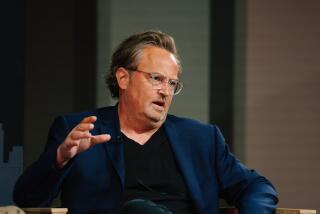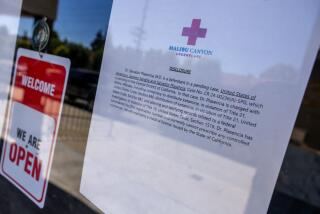Producer provided lunches and rides for Conrad Murray and his team
- Share via
A British documentary film producer provided Conrad Murray and his defense team with free lunches, rides to court and even accompanied the doctor on a shopping trip to upgrade his wardrobe, according to the man who drove the doctor during his six-week trial for manslaughter in the death of Michael Jackson.
The unusual arrangement gave a London-based production company a close-up view unobtainable by any of the news outlets that swarmed around the high-publicity trial, which ended this week with Murray’s conviction.
The support for Murray and his defense also raised new questions about the airing of the documentary, “Michael Jackson and the Doctor: A Fatal Friendship,” this weekend on the cable news network MSNBC because U.S. broadcasters generally frown on giving financial aid to the subjects of news reports.
NBC, parent company of MSNBC, reiterated Thursday that it planned to air the hourlong documentary Friday night and again Sunday, saying the network had not paid the cardiologist or his legal team. One of the production companies responsible for the filming also said it had not paid Murray. But another producer and the distributor of international rights for the film did not comment on financial arrangements.
New details about the filming emerged in an interview with Louis Perry, a Los Angeles-based security executive who drove Murray throughout the trial.
Perry said producer Leon Lecash of what’s it all about? productions paid for daily lunches during the trial and for transportation for Murray and his team to and from the Clara Shortridge Foltz Criminal Justice Center in downtown L.A.
Lecash, a one-time photographer, arranged the exclusive filming with Murray in 2009, even before the cardiologist was charged with administering a lethal dose of the anesthetic propofol to pop idol Jackson. The British native, listed as an executive producer on the program, stayed at a West Hollywood hotel during the trial and paid expenses with a “wad” of cash, Perry said.
Lecash, for example, paid $560 a week for a 12-passenger van that carried the Murray entourage and was outfitted with five of the film crew’s mini-cameras, which Perry said he routinely turned on to film Murray and company as they were in transit.
Lecash also provided lunch, bringing the food to an empty office in the same downtown building where Perry’s Kadima Security Services is based. The defendant, family members and his attorneys would eat in the mostly barren space with windows that look down Figueroa Street toward Staples Center. The documentarian’s cameras rolled through the lunches.
Lecash said via email that the transportation and meals provided to Murray’s team were “legitimate location production costs.” He referred follow-up questions to his London-based publicist, Matthew Robinson, who did not respond to inquiries.
Also not commenting were Murray’s legal defense team, the others involved in the production and Comcast, parent of NBC.
In an interview in his office Thursday, Perry also recalled how, near the start of the trial, he rode along as producer Lecash and defendant Murray went shopping at Bloomingdales. The driver said that Murray acquired at least two suits. He could not say for sure who paid for the clothes, which Murray wore in the courtroom.
Perry said he came forward to describe what he saw because he felt sympathy for Murray and was not sure that the documentary would serve the doctor’s best interests.
“I think the show is going to do more damage than any money that he might have made,” Perry said.
He called Jackson’s one-time personal physician “a really good person, who got caught up in this.” He said he felt the doctor was “surrounded by sharks,” who hoped only to get some financial benefit from their association with him.
Murray at times grew weary of the constant filming, his driver recalled. “He would say, ‘I am tired of these guys. I can’t wait until this thing is done,’ ” said Perry.
The driver said that on the day of the verdict, the crew wanted to record Murray en route to the courthouse, but that Perry rebuffed them.
“I wasn’t going to be a person that would be that insensitive, that would pull over and let them take that picture,” Perry said.
Perry said Murray approached him after he learned about Kadima’s extensive work with public officials, athletes and celebrities. Photos of Perry posing with boxers, entertainers and former Presidents Bill Clinton and George H.W. Bush cover the walls of his 18th floor office on Figueroa Street.
He said the doctor admitted from the start that he was strapped for cash and could not ensure payment for security and transportation.
“But I knew it was a high-profile case and sometimes exposure is a very important aspect of success for a business,” Perry said. He showed a bill for $9,300 in security and transportation but said he never bothered to send it to anyone. He felt his work for Murray might help bring in other clients.
As the trial and production of “Michael Jackson and the Doctor” neared an end, the producers asked Perry to sign a release — clearing them to make him a part of the program. But Perry declined to sign and his lawyer responded with a letter, saying Perry had not been compensated for appearing in the documentary. A lawyer for October Films answered that the driver would not appear in the finished product.
More to Read
The biggest entertainment stories
Get our big stories about Hollywood, film, television, music, arts, culture and more right in your inbox as soon as they publish.
You may occasionally receive promotional content from the Los Angeles Times.












